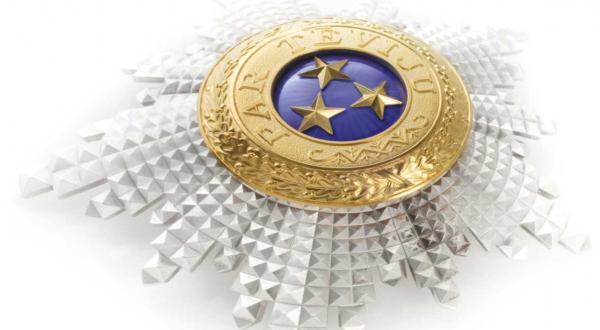RSU and Harvard University have same level of digital infrastructure. Assoc. Prof. Andžāns shares experience as visiting researcher to the US
Linda Rozenbaha,
RSU Public Relations Unit
In June, Māris Andžāns, an associate professor at the Rīga Stradiņš University (RSU) Faculty of Social Sciences, returned from a semester at the prestigious Harvard University. This was an intense trip, as it included conducting research and writing publications.
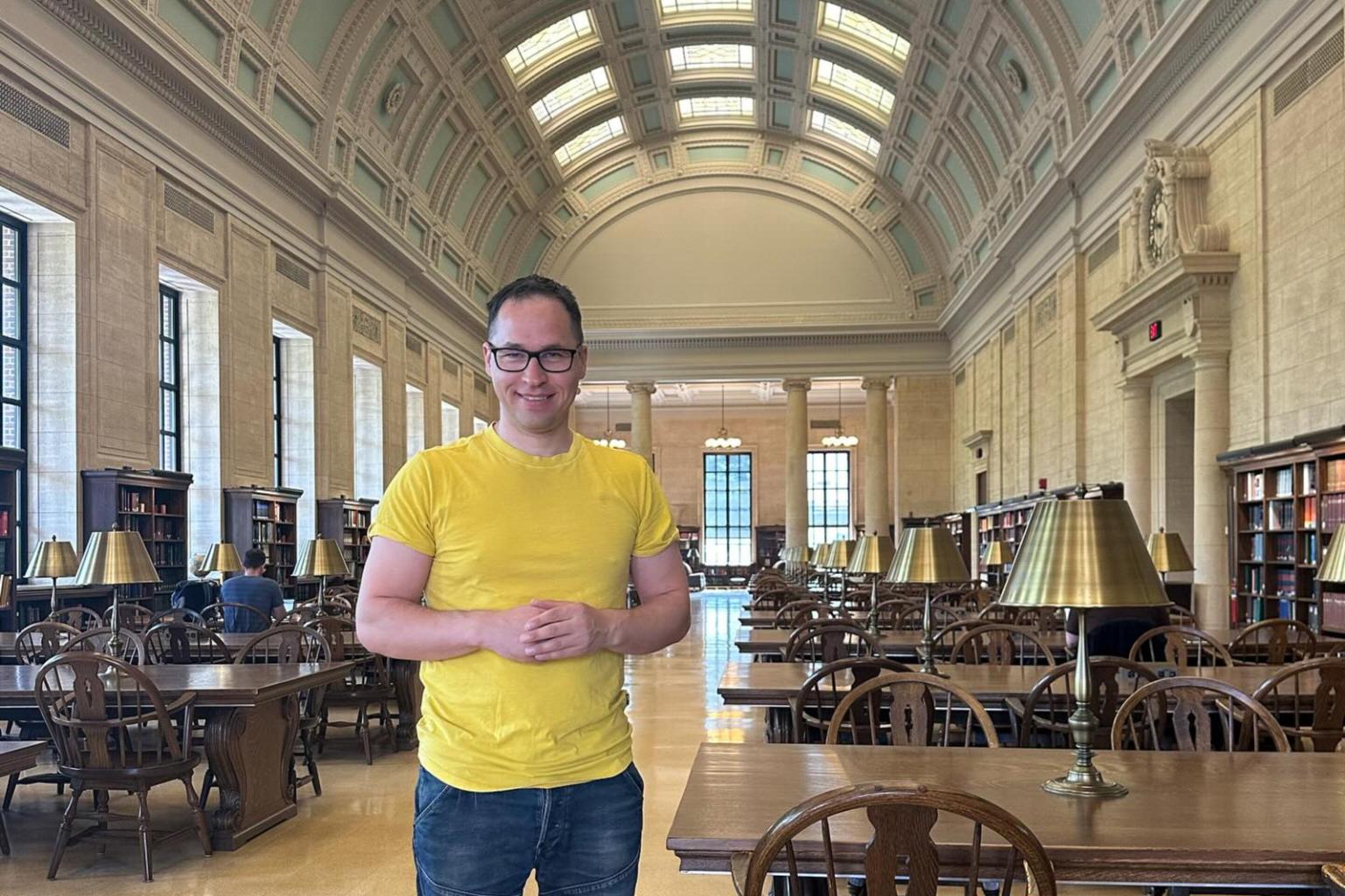
Assoc. Prof. Andžāns in the historic Harvard Library building. Photo from private archive
He got to experience the spirit of the upcoming US elections by attending a rally for Nikki Haley, who was a presidential candidate at the time, and witnessed the Super Tuesday primaries first hand. Additionally, Assoc. Prof. Andžāns had the opportunity to meet politicians and political science stars, whose books he read during his studies.
Andžāns is a popular expert in the Latvian media, commenting on the upcoming US presidential elections.
He is currently implementing his third international long-term research fellowship emphasising that international experience is very important in science: ‘It is generally accepted that a good scientist must go abroad either as a postdoctoral fellow or a visiting researcher. It’s not enough just to read books. The first time I was a visiting researcher was in 2019-2020 to Johns Hopkins University in the US. Last year I went to Germany, to the Academy of International Affairs NRW in Bonn, and this year I went to Harvard University.’
The Baltic States have a very good image in the US
During his stay in the US, Assoc. Prof. Andžāns conducted the study ‘Influence of the Baltic States on US policy towards Russia during the Russian war in Ukraine’. He explains: ‘This means that I studied how the Baltic States influence the political stance of the US towards Russia and the war in Ukraine. Of course, it is difficult to measure the impact just as it is challenging to predict election results because there are so many influencing factors. My conclusion is that the Baltic States definitely had and still have influence on the relevant issue. The image of Ukraine was not perfect in the eyes of the US. It should be mentioned here, that one of former President Donald Trump’s impeachment processes was directly related to Ukraine. And, of course, there are well-known facts about the aspects in which Ukraine needs to progress – combating corruption, improving governance, and other issues. The three Baltic States, in contrast, have a very good image in the US, at least among decision-makers who are familiar with them. We are known for our story of regaining independence and three successful decades as a independent countries.
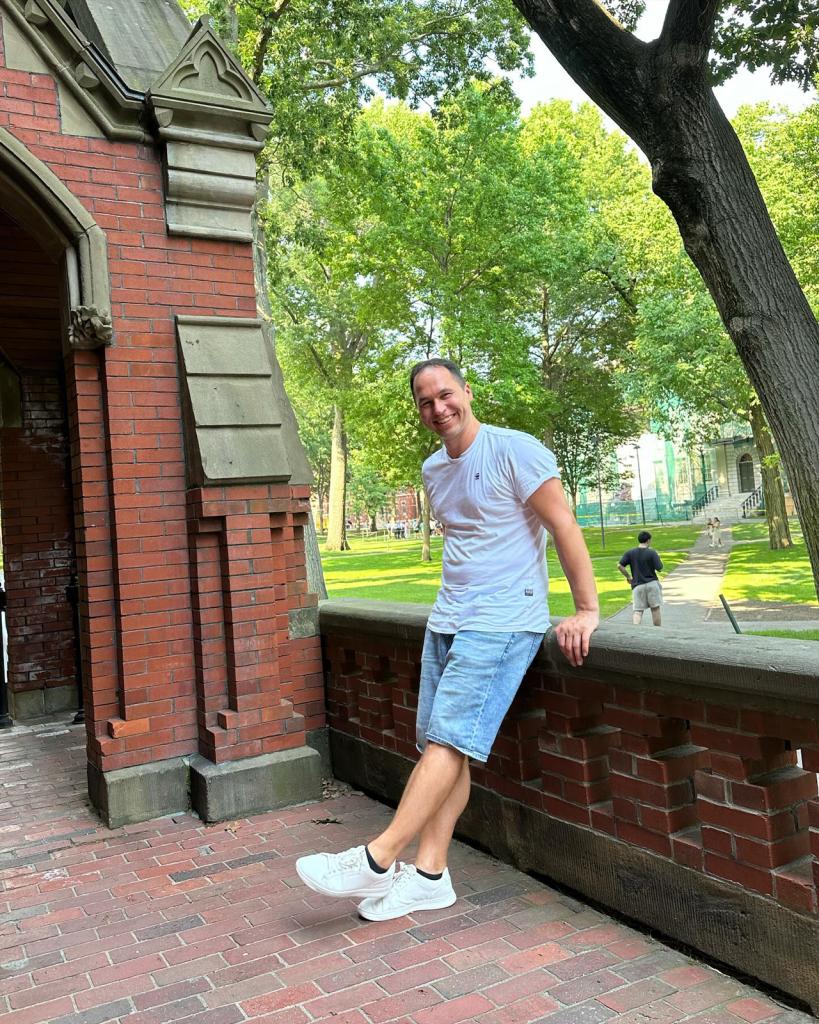
Assoc. Prof. Andžāns outside a building on the campus of Harvard University
We like to criticise ourselves in the Baltics, often with good reason, but on a global scale, we look very good. Additionally, our economic indicators are much better than those of many other countries with which we were forced to be together with in the Soviet Union.
The Baltic States are model democracies, an island of good governance and relative prosperity.
The active organisations of our compatriots in the US – the American Latvian Association, the Joint Baltic American National Committee, etc. – play a role in exerting political influence, like I mentioned before. Latvian, Lithuanian, and Estonian officials frequently make visits to the US Congress, both to executive departments, and other levels. In research interviews with policy makers and observers, I found out that the Baltic States’ support for Ukraine has played a role,’ summarises Assoc. Prof. Andžāns.
He adds that there’s no telling what it would be like if the Baltic States did not support Ukraine... Part of the public in the US refer to the war in Ukraine as ‘some kind of distant war’ and don’t see why they should be interested in it at all. Interviews with political researchers, especially those who study international relations, confirm that the active participation of Baltic people in various events and meetings, appearances in foreign media, increase public understanding of why one should not be indifferent to what is happening in Ukraine.
‘I interviewed policy makers and observers. I also analysed various political processes, looking at how many and what kind of visits by Baltic officials have taken place and what resolutions have followed. As I said, it is clear that this is something that cannot be measured mathematically,’ the researcher adds. He outlines how Baltic support for Ukraine has over time had a snowball effect, followed by other countries: ‘The Baltic States were among the least hesitant in providing military support right from the start of the war, sending necessary armaments. At the time, Germany only helped by providing helmets and similar useful things, which was helpful, but Ukraine needed other things much more.’
It is an interesting phenomenon that being in the US (or in other countries during his other trips) provided Andžāns with better opportunities to meet Baltic politicians and diplomats than in Latvia: ‘I was warmly welcomed by the Ambassador of Latvia to the US Māris Selga and the Ambassador of Latvia to the UN Sanita Pavļuta-Deslandes. Similarly, I had the opportunity to meet the Lithuanian Minister of Foreign Affairs Gabrielius Landsbergis briefly, and hear the opinions of the foreign ministers of the other Baltic States. I also had the opportunity to meet the former President of Latvia Egils Levits (pictured), and the Chairman of the Saeima Defence Committee Raimonds Bergmanis.’
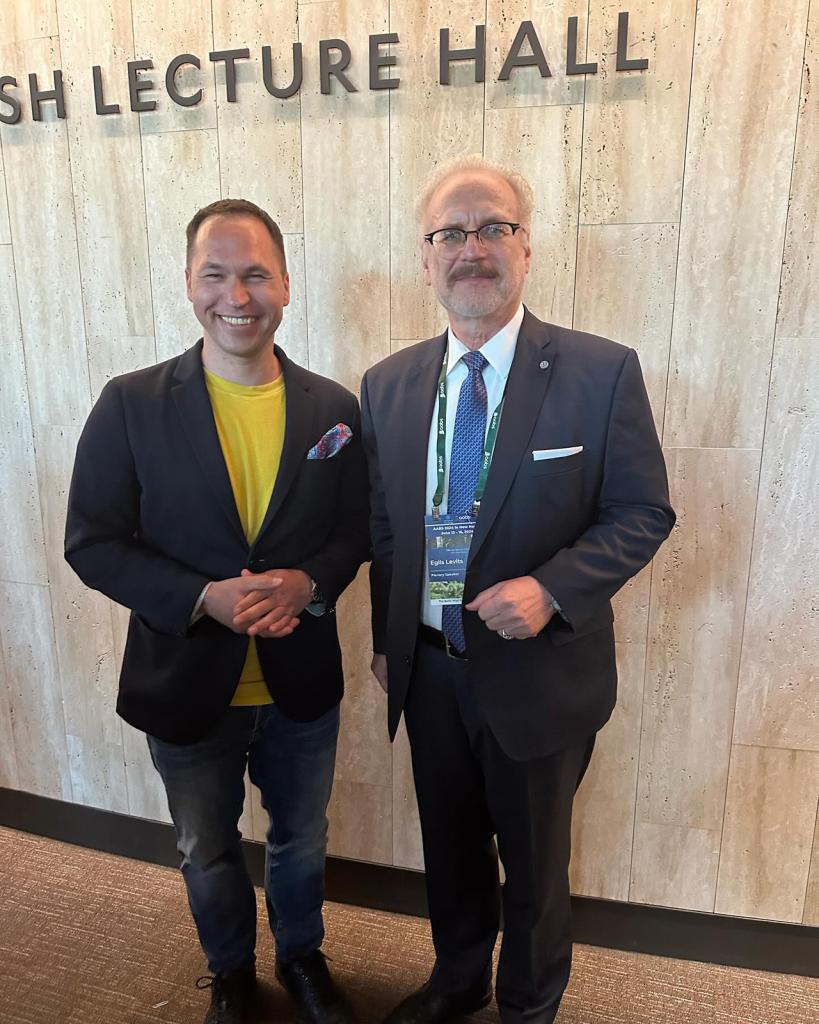
Māris Andžāns with former President of Latvia Egils Levits
In addition to conducting his research, Assoc. Prof. Andžāns wrote publications, including two for the Harvard University website. One was related to the opinions of Russian speakers in Latvia about the war in Ukraine, and the other was about the reinstated mandatory military service in Latvia.
Impressions at the world’s richest university
Harvard University is ranked 4th in the QS World University Rankings*. It is also in the top positions in other significant rankings. ‘This is the richest university in the world,’ notes Andžāns, ‘and has long-standing traditions as it was founded in the 17th century. Of course, its aura and infrastructure are fantastic, unique, and can be felt everywhere!’
Although it would not be entirely correct to compare this giant of higher education with Latvian universities, there is an aspect where, in the researcher’s assessment, RSU measures up:
‘In terms of digital infrastructure, RSU is on par with Harvard University.
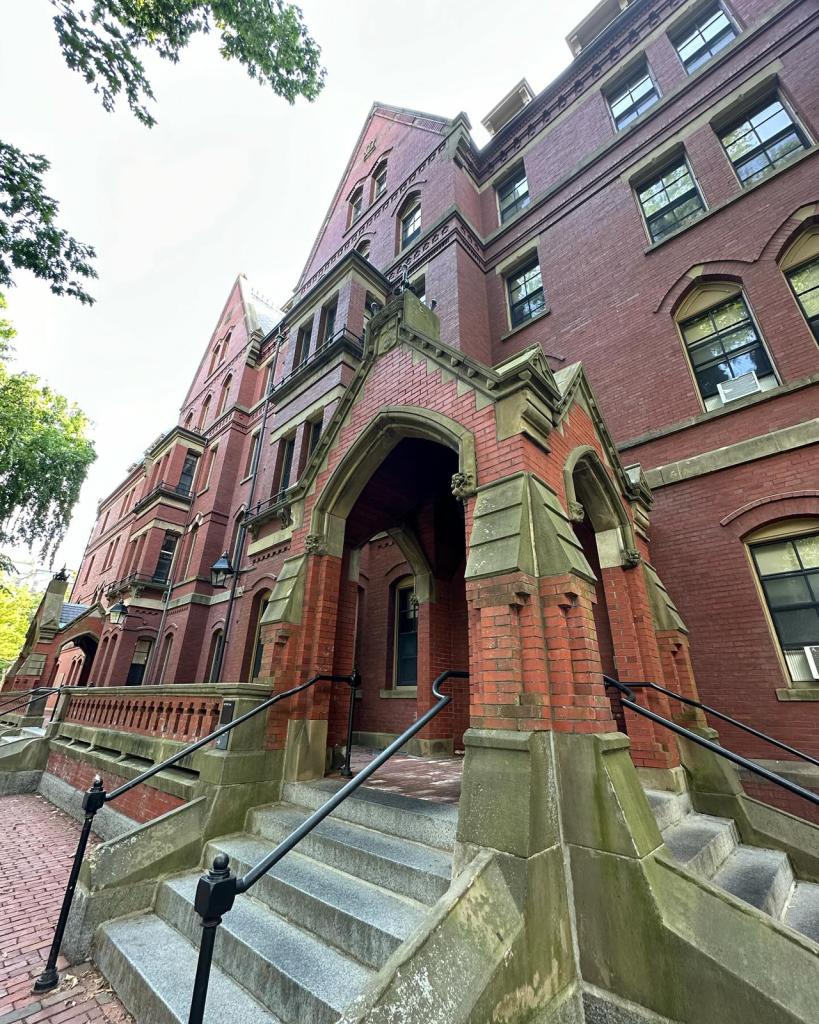
A grand brick building on the campus of Harvard University
Just like at RSU, many processes at Harvard can also be completed digitally, making them convenient and fast. Most of the software they use is the same or similar to that used at RSU.’
As one of the world’s richest universities in terms of traditions and investments, Harvard has many science superstars among its faculty and visiting lecturers. ‘In the fields of political science and international relations, research papers are read by diplomats, politicians, and officials, which gives the researchers particularly high visibility. Legendary academics whose books and publications I read as a student, regularly give lectures at Harvard. For example, Joseph S. Nye Jr., who coined the concept of “soft power”. A true legend! I also had the opportunity to participate in a class by Stephen M. Walt – a member of the realist school of thought in international relations. . I could mention many other professors at Harvard who are authors of world-famous books and other publications. Most of the professors there are truly outstanding,’ says Assoc. Prof. Andžāns.
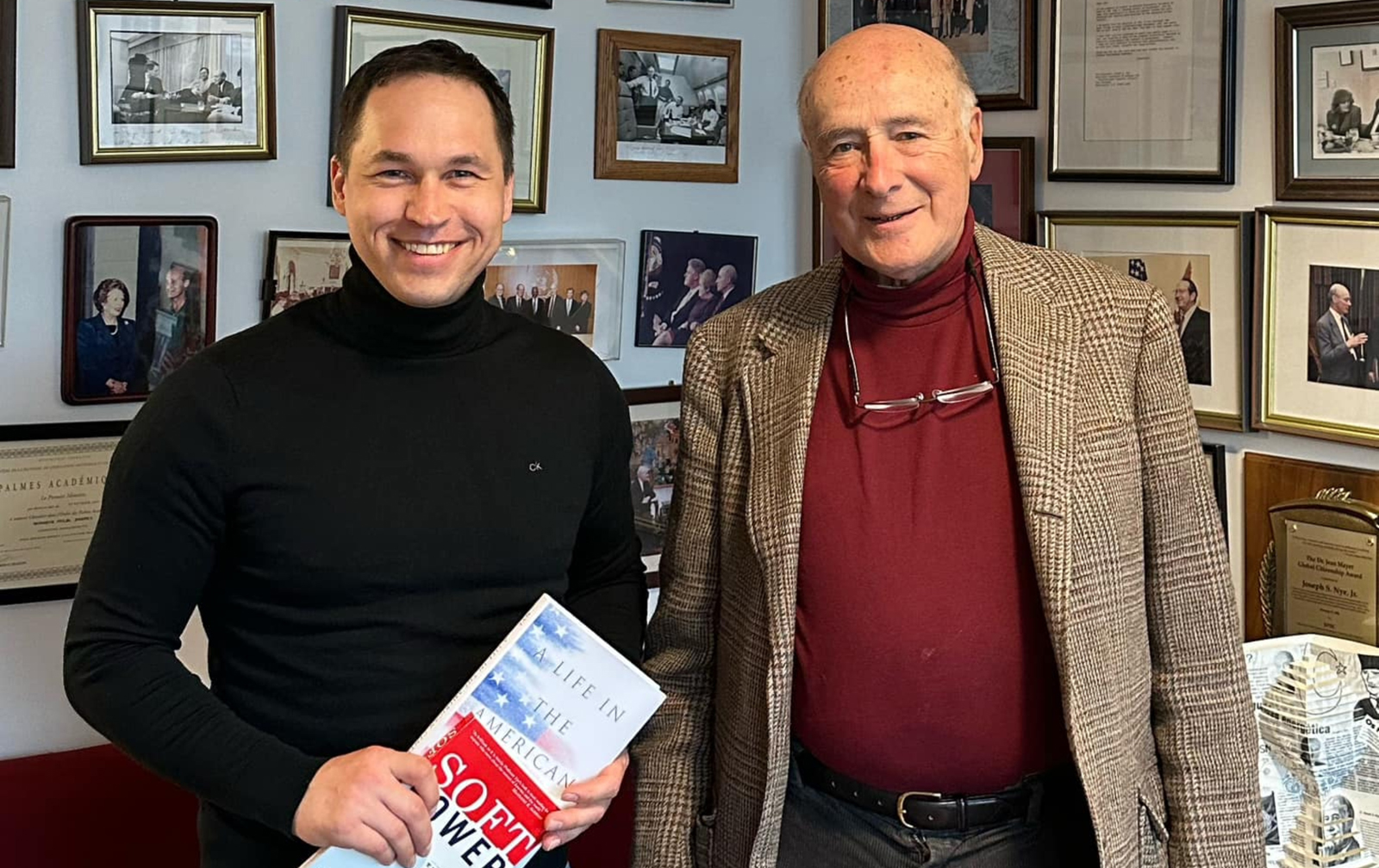 Māris Andžāns (left) describes it as a great pleasure and honour to meet the living legend Prof. Joseph Nye whom he describes as a very open person despite his achievements and status
Māris Andžāns (left) describes it as a great pleasure and honour to meet the living legend Prof. Joseph Nye whom he describes as a very open person despite his achievements and status
Andžāns observed that students at this prestigious university take their studies very seriously. After all, they pay tens of thousands of dollars for their studies. Often, students dedicate themselves to full-time studies, not working on the side during their bachelor studies, as well as during their masters’ or doctoral degree programmes in social sciences. ‘Theoretical, methodological knowledge is at a very high level there. They have the best teaching staff, and the students also strive to be the best, because a diploma from Harvard University opens many doors. In a way, the system in America is less fair, because careers depend very much on which university you have a degree from – it is much more difficult to find a good job if you haven’t obtained it from an Ivy League or similarly highly recognised university (like Yale, Pennsylvania, Columbia, etc.).
I had the opportunity to meet people who would very likely not have responded if I did not write from a Harvard University email address or provide a Harvard University business card,’ says the researcher.
He also notes that the university organises many discussions with current and former politicians: for example, Senator Bernie Sanders, former US presidential candidate, as well as former New York mayor Bill de Blasio.
There are many activities for students outside the university. ‘The community is very lively,’ Andžāns describes.
He lived in a Harvard University apartment building on the campus that has merged with the rest of Cambridge. ‘There are gyms for different tastes, swimming pools, and other activities that the teaching staff, researchers, visiting researchers, and students can make use of. That also creates a sense of unity,’ Andžāns appreciates.
He had the pleasure to meet RSU alumni in the US who work there – one of them is an American, Lee Allen, who graduated with a Master’s Degree in International Relations from RSU and works at the Joint Baltic American National Committee. The other one is Alise Ferrucci (pictured), a graduate of both the bachelor’s and master’s programmes in international relations at RSU who works at the Latvian Embassy in the US.
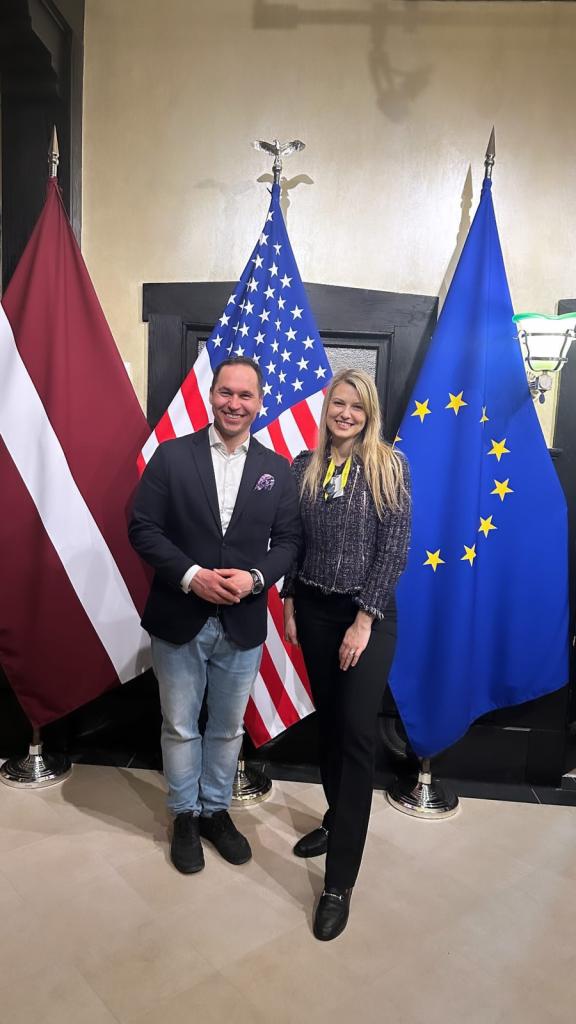
Election rallies as entertainment
During his research visits, Māris Andžāns also visited Washington DC, Philadelphia, and New York.
In order to better understand the political culture in the US, to be able to study and comment on it, is aided not only by research but also by close-up observation of political events outside the university. Andžāns attended a political rally for Nikki Haley who was running for president and was the main Republican challenger to Mr. Trump. Assoc. Prof. Andžāns managed to thank her for her kind words regarding the Baltics and NATO, as well as take a photo with her. On a previous trip to the US, he had the opportunity to attend a Trump rally in Florida as well as a rally for the Democratic candidate Pete Buttigieg near Washington DC.
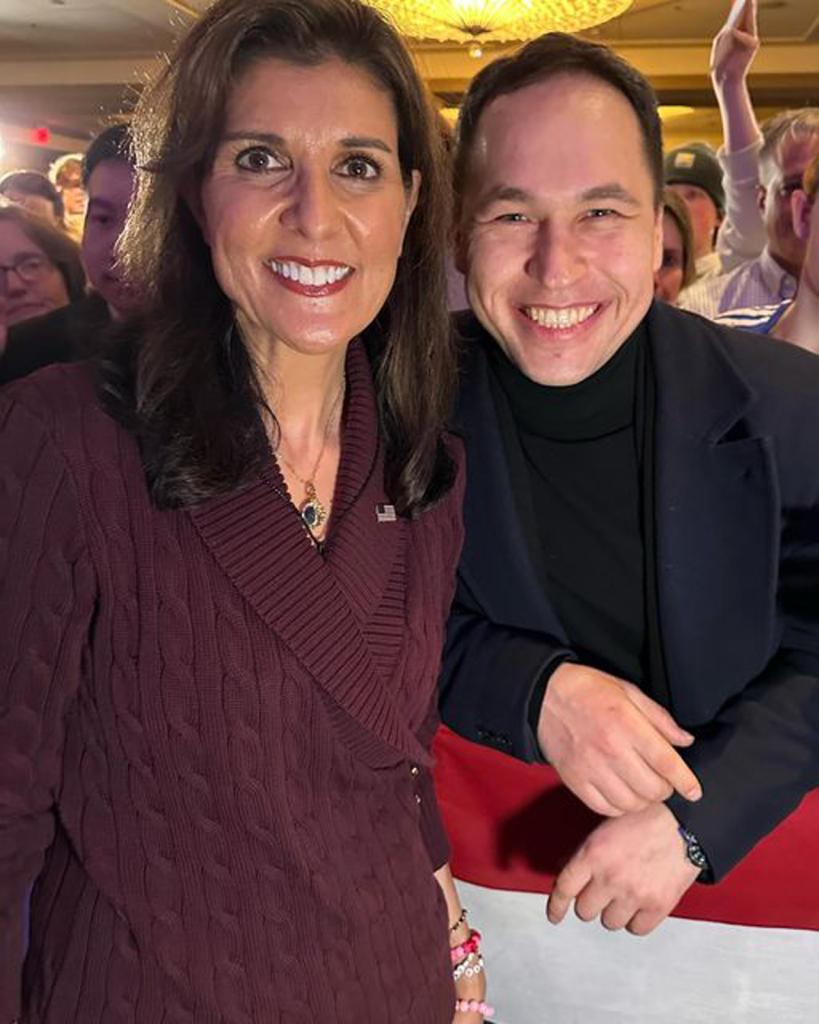
Māris Andžāns posing with Nikki Haley at one of her rallies
In Andžāns opinion, people in Latvia are very passive. In the USA, they go to rallies and express their support for politicians they like loudly. Rallies are often like concerts, shows, with music and a range of other speakers.
Everything in America is a show – both sports and politics.
‘People are very active in putting up placards outside their homes, revealing who they support, and flying flags. It really helps explain the thinking of the people living there. Overall, in America, opinions on politics are very polarised, and it is particularly difficult to discuss domestic issues,’ Andžāns concludes.
During the semester, he managed to travel and observe the election process at several polling stations in Mexico. ‘Everything looks completely different there – the polling stations are heavily guarded by the police, or the national guard with machine guns. It shows the differences between the two neighbouring countries,’ notes the researcher.
When reflecting on his emotional impressions from the trip, a highlight for Andžāns was watching the total solar eclipse in Newport, Vermont.
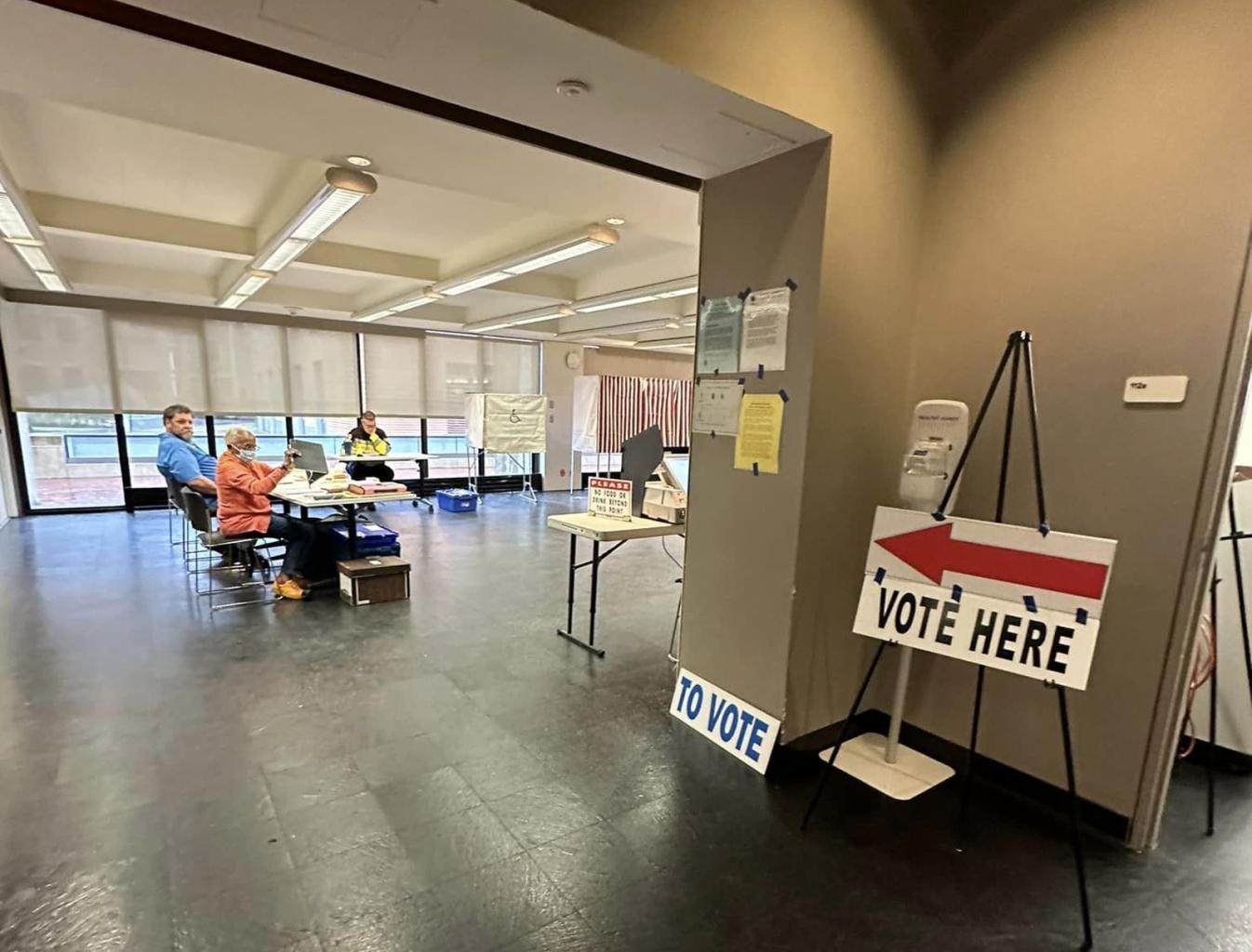
A polling station in the US with a large sign saying "Vote here"
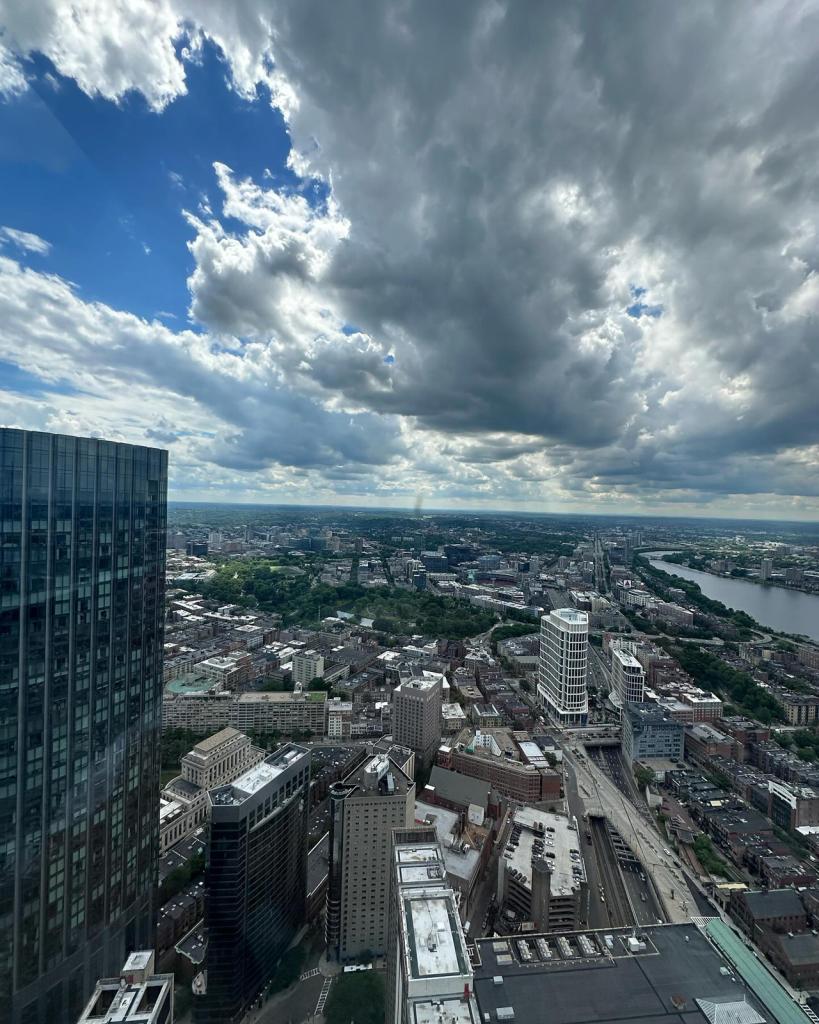
Vew of Boston from a skyscraper
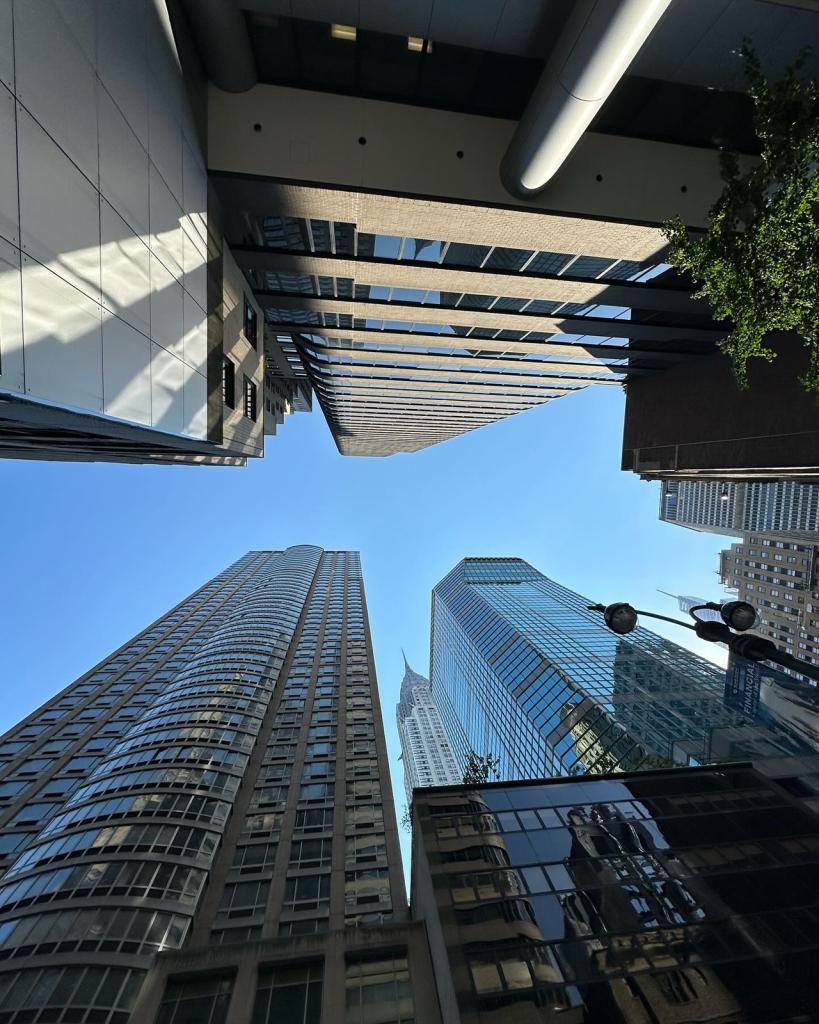
Streetview of New York City
Assoc. Prof. Andžāns will immediately pass on the knowledge and insights he has gained to students at RSU: ‘We will start the upcoming international security study course with seminars on the impact of the US presidential elections on global and Baltic security. Here, I will have the opportunity to share the fresh knowledge I have gained from my trip. I will also be able to deepen the courses on international security with new theoretical and practical insights. This trip has also helped open up more opportunities to help students from RSU go to the US in the future.’
* The Massachusetts Institute of Technology is currently in first place. The University of Cambridge is second and the University of Oxford is third.
